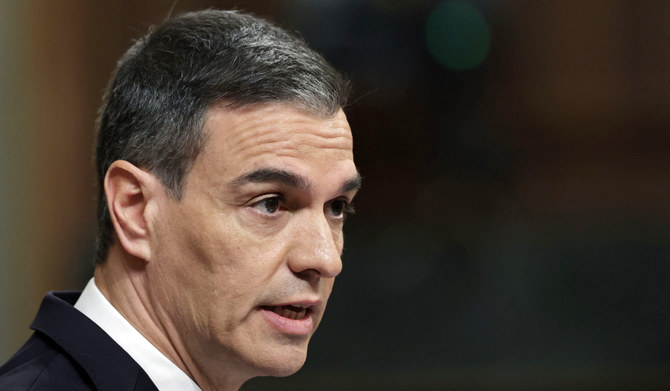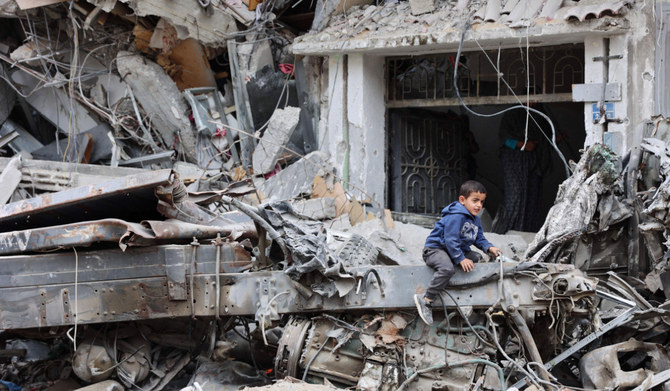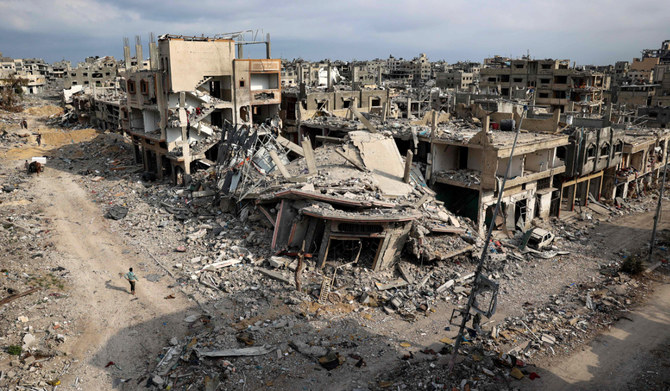MADRID: Spanish Prime Minister Pedro Sanchez has warned that Israel’s “disproportionate response” in the Gaza war with Hamas risks “destabilizing the Middle East, and as a consequence, the entire world.”
Sanchez also insisted that the recognition of a Palestinian state, long resisted by Israel and its key allies, is “in Europe’s geopolitical interests.”
Sanchez had already raised the subject of statehood during a visit last week to the Middle East when he said Spain could recognize Palestine as a nation by the end of June.
“The international community cannot help the Palestinian state if it does not recognize its existence,” Sanchez told lawmakers on Wednesday.
Since the start of the war in Gaza more than six months ago, the socialist premier has pushed for Europe to accord such recognition.
BACKGROUND
Prime Minister Pedro Sanchez’s criticism of the Gaza war has raised tensions with Israel.
His criticism of the Gaze war has also raised tensions with Israel.
Speaking on Wednesday, Sanchez said Israel’s “absolutely disproportionate response” had “overturned decades of humanitarian law and threatened to destabilize the Middle East and, as a consequence, the whole world.”
In February, Sanchez and his Irish counterpart at the time, Leo Varadkar, asked the EU to “urgently” examine whether Israel was complying with its human rights obligations in Gaza as laid out in a key accord that links rights to trade ties.
And in November, Israel recalled its Madrid envoy for consultations after expressing fury over Sanchez’s “outrageous remarks” in a television interview, in which he expressed “serious doubts” over the legality of Israel’s actions in Gaza.
His remarks were denounced by Israeli Prime Minister Benjamin Netanyahu as “shameful,” though the Israeli Ambassador Rodica Radian-Gordon returned to Madrid in January.
Israel was also angered by statements in October and November by radical left-wing ministers in Sanchez’s coalition government calling for sanctions and an embargo on arms sales to Israel.
While visiting a Palestinian refugee camp in Jordan last week, Sanchez hit out at Israel over the drone strike on a humanitarian convoy that killed seven staff members of the NGO World Central Kitchen.
He demanded that Israel clarify “the circumstances of this brutal attack.”
Like most other global leaders, Sanchez has called for the implementation of the two-state solution but has also pressed for the world to recognize a Palestinian state, breaking with other Western powers who say this should come only as part of a negotiated peace with Israel.
Last week, Sanchez told reporters traveling with him on his Middle East tour that he hoped Spain would recognize Palestinian statehood by the end of June.
In late March, Sanchez signed a joint statement alongside his Irish, Maltese, and Slovenian counterparts on the sidelines of an EU summit announcing they were ready “to recognize Palestine” when “the circumstances are right” if that could help resolve the conflict.
Spanish government spokeswoman Pilar Alegria said on Tuesday that starting Thursday, Sanchez is due to visit Poland, Norway, and Ireland before welcoming Portugal’s leader to discuss the issue again.
In an opinion piece for Madrid’s Real Instituto Elcano think tank, former Israeli Ambassador Alon Liel said Spain’s move to recognize a Palestinian state could “ignite the momentum that might lead to overall European and UN recognition.”
If so, “Spain would become a meaningful player toward a new diplomatic momentum for the Israeli-Palestinian conflict,” wrote Liel, a former director-general of the Israeli Foreign Ministry.
In 2014, the Spanish parliament had called on the right-wing government at the time to recognize a Palestinian state, just a few weeks after Sweden became the first EU member in Western Europe to do so.
Sweden’s recognition mirrored earlier moves by six other European countries: Bulgaria, Cyprus, the Czech Republic, Hungary, Poland and Romania.




























